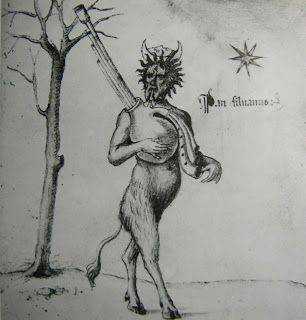Paganistan: Notes from the Secret Commonwealth
In Which One Midwest Man-in-Black Confers, Converses & Otherwise Hob-Nobs with his Fellow Hob-Men (& -Women) Concerning the Sundry Ways of the Famed but Ill-Starred Tribe of Witches.
Triptych, with Horns
In India, on nights of the autumn full moon, the blue god Krishna stands in a clearing in the forest and plays his flute.
Hearing this, his worshipers—regardless of caste or marital status—cast social convention aside, and rush off to the woods for an ecstatic celebration, in which they dance wildly and have sex with their god.
This is called the rasa-lila, or "juice-play."
***
Among the Kalasha of what is now Pakistan, the only surviving Indo-European people who have practiced their ancestral religion continuously since ancient times, the presiding figure of the Prûn festival, the autumnal celebration which honors the grape-harvest and the return of the flocks from their summer pastures, is called the Budálak.
The Budalak is a virile young goat-herd who, dressed in goat-skins and horns, dances vigorously with the young women in wine-fueled, fire-lit nighttime celebrations, while—to the sound of drums and flutes—the old women sing his raunchy, raucous songs.
Those whom the Budalak touches with his horns will become pregnant within the year. In former times, he mated freely with any woman that would have him, and children born from these unions were considered fortunate.
***
In medieval and Renaissance Europe women of all social classes were said to rendez-vous in wild places with the Devil, at the infamous witches' sabbat.
There they would drink, dance wildly, and commit "carnal copulation" with their (horned) god.
The Devil was widely known to be a musician—the best tunes are all his, they say—and in any given region he generally played whatever instrument usually accompanied dancing.
In Scotland, he was said to play the bagpipes.
***
Draw your own conclusions.
Comments
-
Please login first in order for you to submit comments





















